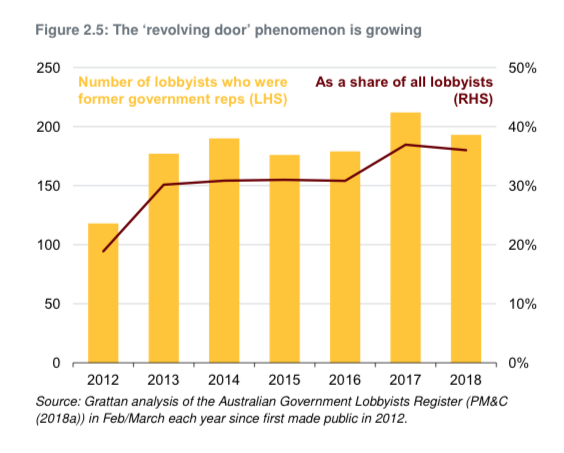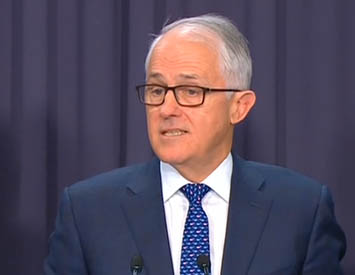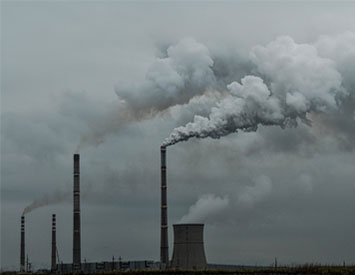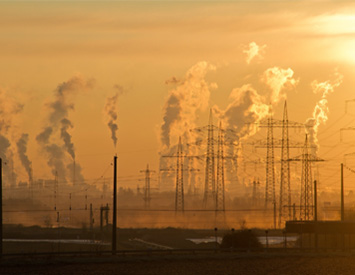Due to an unstable roster of ministers, Australia's climate and energy policy has been suffering, writes Giles Parkinson.
HERE ARE TWO QUESTIONS that go to the state of Australia’s policy-making and the health of its democracy. They are particularly relevant as we watch, in horror, the course that climate and energy policy is taking in this country.
Australia’s policy-making is dominated – as we suspected – by the visible, but mostly invisible hand of vested interests and lobbyists. The extent of this is revealed by a new report from the Grattan Institute — 'Who’s in the room? Access and influence in Australian politics'.
The report reveals that access and influence are heavily skewed towards the businesses and unions that have the most to gain (and lose) from public policy and how vulnerable it is to regulatory capture.
And here is where we get the two Orwellian responses to two crucial questions highlighted by Kate Griffiths, one of the co-authors of the report.
Q1: What is the penalty if you are caught lobbying on behalf of a company and/or industry, without being registered as a lobbyist?
Answer: De-registration. The penalty for acting as a lobbyist without registration is to lose the registration that you didn’t have.
Q2: What is the penalty if you are a former government minister who has left parliament and you are discovered lobbying in the area of your former portfolio?
Answer: The penalty for a former minister acting as a lobbyist in his former portfolio is the loss of the ministerial duties you no longer have.
Absurd? As Griffiths notes: 'It is as ridiculous as it sounds.'
'While Australia is locked in a policy quagmire on climate action, the world is moving on and this makes sound investment and economic sense.' https://t.co/r6k57Iaiad @farmingforever @agchatoz
— Corey Watts (@BrightWaterSci) September 27, 2018
And it may explain how it is that Australian politics and policies are so corrupted.
Readers of RenewEconomy will be familiar with the “revolving door” on advisers to climate and energy policy and the close links between the Coalition Government and the Minerals Council of Australia, along with similar state-based bodies, former energy ministers and the “peak” bodies for the fossil fuel industry.
Think Martin Ferguson, the Labor resources minister (including energy), who joined the oil and gas peak body APPEA within six months of retirement, or Ian Macfarlane, the former Coalition industry minister (including energy), who joined the Queensland Resources Council within 12 months.
Then there is Gary Gray, the former Labor national secretary who squeezed in a stint with Woodside Petroleum between that job and his stint as resources minister, where he described himself, Macfarlane and Ferguson as “three peas in a pod”. Even Labor Climate Minister Greg Combet has acted as a consultant to both AGL and Santos since retiring.
Hang on? Aren’t politicians not supposed to join a lobby group? Handily, peak bodies are not described as lobby groups per se — although it is hard to imagine what else it is that they think they might be doing.
It doesn’t stop with ministers and what the Grattan Institute calls “golden escalators”, it is also with the “revolving door” of ministerial advisors.
As RenewEconomy has noted on numerous occasions, Greg Hunt’s former advisor is now with the Minerals Council, the Minerals Council’s former chief policy advisor was a senior adviser with former Prime Minister Malcolm Turnbull and the Minerals Council’s former deputy CEO is now chief of staff for Prime Minister Scott Morrison.
The Minerals Council, of course, is the organisation that provided the lump of coal that Morrison waved around Parliament last February, before bagging South Australia's big battery as being about as useful as the Big Banana. Since becoming PM, Morrison hasn’t stopped talking about “fair dinkum” power — coal.
The new head of the Energy Supply Council, the energy peak body, is Sarah McNamara, who has been everywhere: With AGL as their principal government lobbyist, with Tony Abbott as advisor on energy and climate when he was prime minister and then with Macfarlane as chief of staff with the Industry ministry.
And the links are even more extensive. This article by Adam Lucas and Joel Holland itemised the numerous links between the offices of Ferguson and Macfarlane, amongst others, and key industry groups including the Minerals Council, APPEA and the NSW Minerals Council.
Did you know that Ferguson’s secretary, John Pierce, is now chairman of the Australian Energy Market Commission, that his senior policy advisor Michael Bradley became director of external affairs for APPEA, or that another policy advisor, James Sorahan, became director of taxation for the Minerals Council?
Did you know that Macfarlane’s chief of staff between 2001 and 2004, Stephen Galilee, is CEO of the NSW Minerals Council, that another former chief of staff, Malcolm Roberts, became CEO of APPEA and that former policy advisor Lindsay Hermes had previously been media manager for the NSW Minerals Council?
What do APPEA, the Minerals Council, the Queensland Resources Council and the NSW Minerals Council have in common? Between them, according to the Grattan Institute report, they contributed more than $300 million to the campaign against the carbon price, which Labor implemented and Abbott’s Coalition tore down.
According to the Grattan Institute, these major lobby groups spent more than $300 million on advocacy between 2010 and 2014, including on an anti-carbon tax advertising campaign.
As noted in the report:
‘Since then, the policy paralysis appears to have been the result of political and ideological divides rather than special-interest activism. The result is that in 2018 Australia still lacks a credible mechanism to achieve its Paris Agreement commitments.’
Climate and energy policies are just one sector where vested interests have been able to exert undue influence. Think gambling, racing and pharmaceutical industries. Most are in highly-regulated industries, where vested interests have much to lose.
Griffiths says one of the key problems is that there is no visibility on who the ministers are meeting with.
“We don’t know when they are meeting, who was in the room at the time.”
Where data is available, for the Queensland and NSW Governments, it shows that there is a dominance by big industry.
So much so that who is in the room is as concerning as who is not in the room, which tends to be the groups that represent consumers.
Griffiths notes:
“You do wonder if they are getting a well-rounded view.”
The report notes the movement of advisors creates a certain “cosiness”, and increases the likelihood that the well-resourced are heard more often and more sympathetically in policy discussions.
“This poses a risk to good decision-making: policy makers should be listening to interest groups with the best ideas, not simply those with the right connections.”
Australia on track to miss Paris climate targets as emissions hit record highs https://t.co/AukVGwm6x6
— Seano [-0-] (@SeanBradbery) September 20, 2018
No #ClimateChange or Energy policies.
A unfair and unsustainable Education Funding policy.#ReefGate #CashOut Dutton's scandals.
No legislative agenda.#NoMandate#ElectionNow
This article was originally published in RenewEconomy on 24 September 2016 under the title 'Revolving doors, golden escalators and the demise of climate and energy policy' and has been republished with permission. You can follow Giles Parkinson on Twitter @GilesParkinson.

Monthly Donation
Single Donation
Your most stable form of news. Subscribe to IA.













